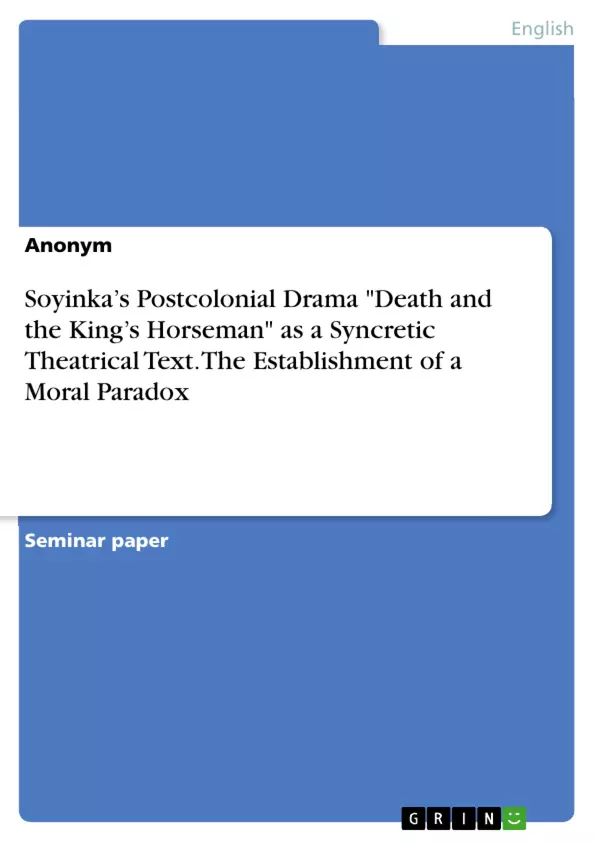This paper argues that the establishment of this moral paradox is particularly conditioned by Soyinka’s conscious choice of writing this play in the form of the syncretic theatre because the Yoruba’s psychology is perfectly portrayed through cultural texts and a shift of dominants concerning the dramatic devices which enables the reader to empathise with the Yoruba culture and its, for a European audience, barbaric and illegal practices. On that account, this paper reads Soyinka’s play Death and the King’s Horseman as a syncretic theatrical text par excellence and aims to demonstrate how the specific elements of this genre are 2 implemented in the text as this is necessary to demonstrate the effect those elements have on the establishment of a moral paradox
Inhaltsverzeichnis (Table of Contents)
- Introduction
- The Syncretic Theatre
- Definition and Characteristics
- The Cultural Text
- The Shift in the Hierarchy of Dramatic Devices
- The Fusion of Cultures and Theatre Traditions in Death and the King's Horseman
- Ritual Suicide and the Dramaturgy of the Ritus Interruptus
- Cultural Texts in Soyinka's Play
- Music and Dance
- Drumming
- Clothing and Costumes
- Dominant Shift
- The Moral Paradox
- Conclusion
Zielsetzung und Themenschwerpunkte (Objectives and Key Themes)
This paper aims to analyze Wole Soyinka's play Death and the King's Horseman as a prime example of syncretic theatre. It focuses on how the blending of Yoruba culture and Western theatrical conventions creates a compelling moral paradox, highlighting the conflict between colonial laws and traditional practices.
- The syncretic nature of Soyinka's play and its significance for understanding the moral paradox
- The role of cultural texts in portraying Yoruba psychology and traditions
- The shift in the hierarchy of dramatic devices to emphasize non-dialogic elements
- The moral dilemma posed by the conflict between colonial law and Yoruba ritual suicide
- The impact of syncretic theatrical elements on audience engagement and understanding
Zusammenfassung der Kapitel (Chapter Summaries)
The paper begins by introducing the concept of ritual suicide and its legal complexities in various societies. It then dives into the context of colonial rule and the clash between Western laws and traditional practices, particularly in the case of Soyinka's play.
The second chapter defines and characterizes the syncretic theatre, emphasizing its origins in postcolonial contexts and its reliance on cultural texts and the blending of diverse performance forms.
Chapter three explores the specific examples of cultural texts and the shift in dramatic devices within Death and the King's Horseman. This chapter analyzes the play's use of music, dance, drumming, and costumes to highlight the clash between Yoruba culture and Western sensibilities.
Schlüsselwörter (Keywords)
The paper focuses on key terms such as syncretic theatre, cultural texts, dramatic devices, ritual suicide, colonial law, Yoruba culture, moral paradox, and postcolonial drama. It uses these terms to analyze Death and the King's Horseman as a theatrical text that effectively communicates the complexities of cultural conflict and the construction of moral dilemmas.
- Arbeit zitieren
- Anonym (Autor:in), 2020, Soyinka’s Postcolonial Drama "Death and the King’s Horseman" as a Syncretic Theatrical Text. The Establishment of a Moral Paradox, München, GRIN Verlag, https://www.grin.com/document/1035036



